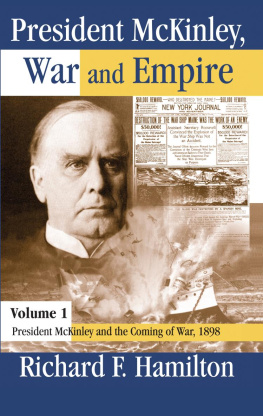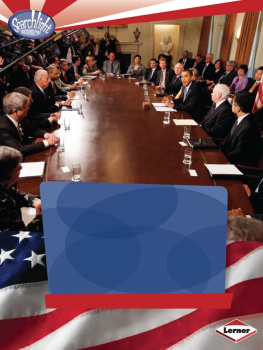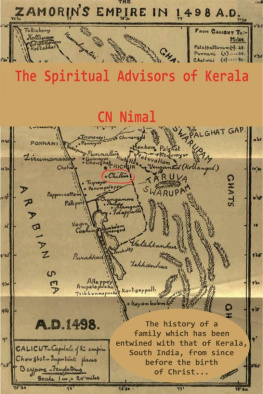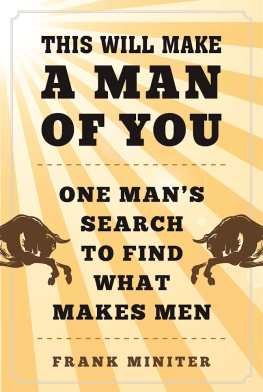Richard Miniter - Leading from Behind: The Reluctant President and the Advisors Who Decide for Him
Here you can read online Richard Miniter - Leading from Behind: The Reluctant President and the Advisors Who Decide for Him full text of the book (entire story) in english for free. Download pdf and epub, get meaning, cover and reviews about this ebook. year: 2012, publisher: St. Martin’s Press, genre: Science / Politics. Description of the work, (preface) as well as reviews are available. Best literature library LitArk.com created for fans of good reading and offers a wide selection of genres:
Romance novel
Science fiction
Adventure
Detective
Science
History
Home and family
Prose
Art
Politics
Computer
Non-fiction
Religion
Business
Children
Humor
Choose a favorite category and find really read worthwhile books. Enjoy immersion in the world of imagination, feel the emotions of the characters or learn something new for yourself, make an fascinating discovery.

- Book:Leading from Behind: The Reluctant President and the Advisors Who Decide for Him
- Author:
- Publisher:St. Martin’s Press
- Genre:
- Year:2012
- Rating:3 / 5
- Favourites:Add to favourites
- Your mark:
- 60
- 1
- 2
- 3
- 4
- 5
Leading from Behind: The Reluctant President and the Advisors Who Decide for Him: summary, description and annotation
We offer to read an annotation, description, summary or preface (depends on what the author of the book "Leading from Behind: The Reluctant President and the Advisors Who Decide for Him" wrote himself). If you haven't found the necessary information about the book — write in the comments, we will try to find it.
Richard Miniter: author's other books
Who wrote Leading from Behind: The Reluctant President and the Advisors Who Decide for Him? Find out the surname, the name of the author of the book and a list of all author's works by series.
Leading from Behind: The Reluctant President and the Advisors Who Decide for Him — read online for free the complete book (whole text) full work
Below is the text of the book, divided by pages. System saving the place of the last page read, allows you to conveniently read the book "Leading from Behind: The Reluctant President and the Advisors Who Decide for Him" online for free, without having to search again every time where you left off. Put a bookmark, and you can go to the page where you finished reading at any time.
Font size:
Interval:
Bookmark:
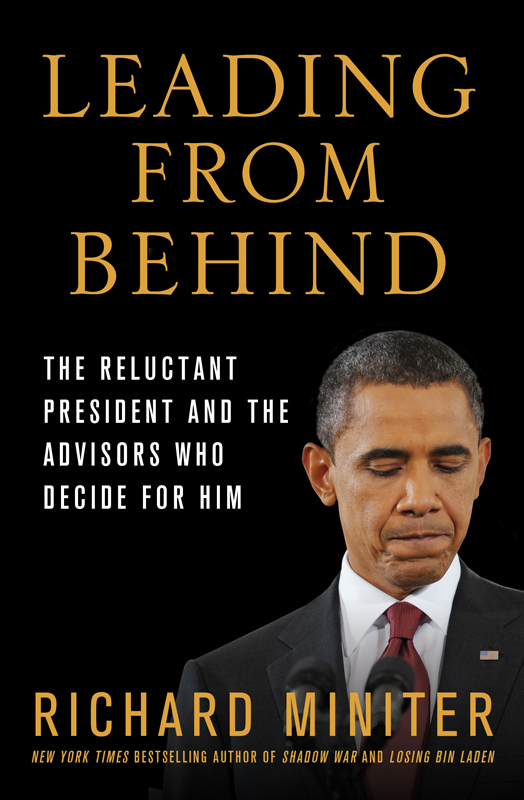

The author and publisher have provided this e-book to you for your personal use only. You may not make this e-book publicly available in any way. Copyright infringement is against the law. If you believe the copy of this e-book you are reading infringes on the authors copyright, please notify the publisher at: us.macmillanusa.com/piracy.
THE PERSPECTIVE
This book is about presidential leadership at a particular historical moment, and is the first book of its kind in the Obama years. Leading from Behind is solely concerned with the six pivotal decisions of the Obama years and how and why the president decided as he did. It is a book about leadership and decision-making, grounded in history, fact, and direct observation. The quality of the presidents leadership is the essential question of the year 2012.
It is important that this question be answered fairly. In that spirit, I have relied extensively and exclusively on President Obamas admirers and advisors, allies, and associates. Democrats all. The stray few Republicans, who were interviewed for this book, were consulted solely to gather their eyewitness accounts of President Obama in private meetings. All of the secondary sources, newscasts, and newspapers, are mainstream outlets that, if anything, tend to favor the president over his critics and rivals.
To Nina Rosenwald, who, as usual, had an idea
CONTENTS
INTRODUCTION
For we are strangers before them, and sojourners, as were all our fathers.
Exordium chosen by Barack Obama for Dreams from My Father, drawn from I Chronicles
The Unanswered Question
What kind of a leader is Barack Obama?
Strangely enough, for a president in his fourth year of office, this remains an open question.
So far the press has been uncharacteristically reluctant to probe the nature of Obamas leadership abilities. Part of the reason is that ideology colors the coverage and obscures Obama, the real leader. Instead the media presents an empty screen on which are projected the hopes and fears of partisans, Left and Right, leading his enemies to overestimate him and his friends to misunderstand him.
On the Right, Obama is seen as an evil genius with a dark, complex plan to ruin America. On the establishment Left, he is portrayed as a man dealing with immense problems inherited from his unpopular predecessor, who, through it all, somehow has racked up historic achievements. Bill Keller, a New York Times columnist, writes that Obamas critics overlook his real accomplishments, achieved despite a brutally divided government. Lost in the shouting is the fact that Obama pulled the country back from the brink of depression; signed a health care reform law that expands coverage, preserves choice, and creates a mechanism for controlling costs; engineered fairly stringent financial regulatory reform; and authorized the risky mission that got Osama bin Laden. All true enough, but misleading and avoid the issue of Obamas leadership abilities.
Both of these dueling media narrativesLeft and Rightfail to consider Obama, the leader. They embody opinions only about the outcomes of Obamas decisions, not the process that made those decisions. They tell us the medias take on his decisions, not the quality of those decisions.
So the question remains: What kind of a leader is Barack Obama?
Evaluating Obamas leadership abilities means investigating his signal successes, those banner-headline moments he will campaign on in 2012 to make the case for his reelection. Hidden in each success (and in some dangerous failures) is a case study in how Obama makes presidential decisions. The only way to probe his leadership abilities is to interview participants and eyewitnesses in the White House, in Congress, in the Pentagon, and in several foreign capitals. This is what I set out to do in the pages that follow.
The Mystery
Barack Obama is the most mysterious manager of our age.
He appeared suddenly, like a meteor dropping from the night sky. Within four years of his first, fleeting appearance on the stage at the Democratic National Convention in 2004, he became president of the United States. He had moved so quickly that his 2008 presidential campaign felt compelled to repeatedly reintroduce him, to tell his life story in flickering videos and campaign speeches. When his autobiography was reissued during the campaign, it became a No. 1 New York Times bestseller. Its sales were driven by curiosity, an urgent desire to know: Who is he?
The mystery did not burn away in the heat of the presidency, the most public office in the world. As president, he has remained surprisingly aloof, distant, and private. He stands apart in our joined-up, interconnected, social-networked world. In a hint of self-criticism in his autobiography, he writes: I had grown too comfortable in my solitude, the safest place I knew. Indeed, Obama may be the most solitary man to hold the office of president.
Social circles usually widen as presidents build alliances and recruit the public to their side. Strangely, Obamas circle shrank. State dinners, public receptions, and private moments with the barons and baronesses of Washington, were few. His disdain for official Washington was not a campaign pose, but a genuine feeling, welling from a deep inner spring.
It is not that he dislikes power or the perks that come with ithis elated explanation to Oprah Winfrey about the joys of having White House butlers, servants, guards, and other attendants testifies to that. But he dislikes the public give-and-take of politics. He distrusts the idea that political decisions are supposed to be a collaborative enterprise involving experts and executives with conflicting interests, similar to making a movie or running a corporation. Instead he wants the presidency to be more like writing a book or commanding a battalion, a lone decider who hands down commands. He retreats from people, aside from a small trusted circle, because he believes power is sullied when it is shared.
As a result, even old friends found themselves marooned. Christopher Edley Jr., the dean of the University of California at Berkeleys law school had been a friend and informal advisor to Obama for years. Often he would phone or text ideas or mild critiques to Obama while he was on the campaign trail. When he wrote the president a short note to take issue with a public statement in 2010, he received a call from Obamas most powerful and influential advisor, Valerie Jarrett. She said the president did not appreciate his remarks. The abruptness surprised the mild-mannered scholar. The president no longer tolerated even moderate criticism from a friendly liberal source.
And the president famously said he didnt want any new friends. There is no evidence that Obama has added many new friends since he moved to the White House, except for a handful of Secret Service agents. One trusted friend, presidential body man Reggie Love, has even left his position at the White House to earn his masters degree.
Isolationmore than previous presidentsseems to be the rule in the Obama White House.
Informal moments paint the picture. When watching his beloved Pittsburgh Steelers win the 2009 Super Bowl, Obama didnt mix much with the guests packed in the yellow-walled Oval Room in the White House residence. (The White House staff, not the president or first lady, had invited most of the guests.) Obama sat directly before the television, positioned in the front of the room, with an empty seat to his right. To his left sat a longtime pal, Marty Nesbitt, an African American from Chicago who plays no formal role in national politics. Behind the president were clustered other longtime Chicago friends, with Attorney General Eric Holder leaning confidently against a wall. Virtually everyone physically close to the president was African American and linked to Chicago. Farther back sat Congressman Mike Doyle, a reliable white Democrat from Pittsburgh, where the Steelers hail from. Farther back still were other political supporters. The Washington insiders were packed into the outer reaches of the room, like Pluto elliptically orbiting a distant sun.
Font size:
Interval:
Bookmark:
Similar books «Leading from Behind: The Reluctant President and the Advisors Who Decide for Him»
Look at similar books to Leading from Behind: The Reluctant President and the Advisors Who Decide for Him. We have selected literature similar in name and meaning in the hope of providing readers with more options to find new, interesting, not yet read works.
Discussion, reviews of the book Leading from Behind: The Reluctant President and the Advisors Who Decide for Him and just readers' own opinions. Leave your comments, write what you think about the work, its meaning or the main characters. Specify what exactly you liked and what you didn't like, and why you think so.

